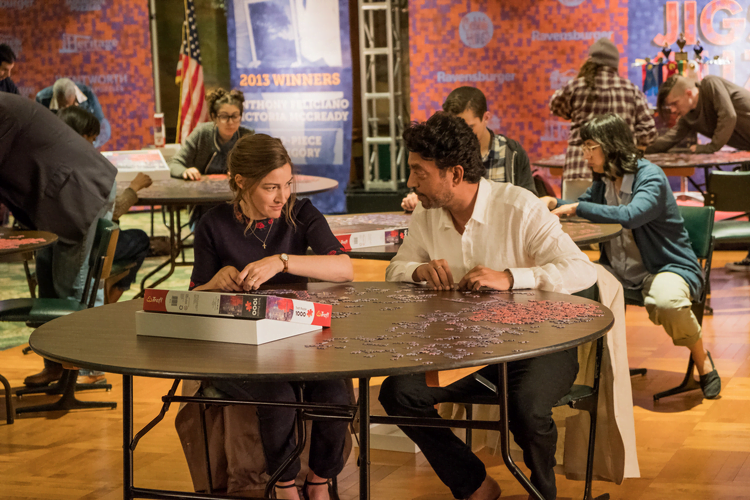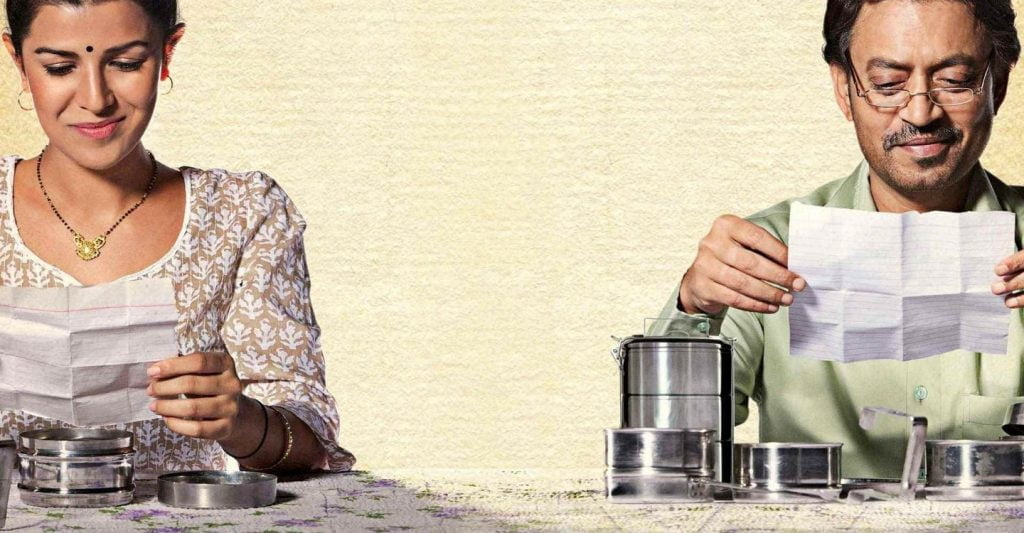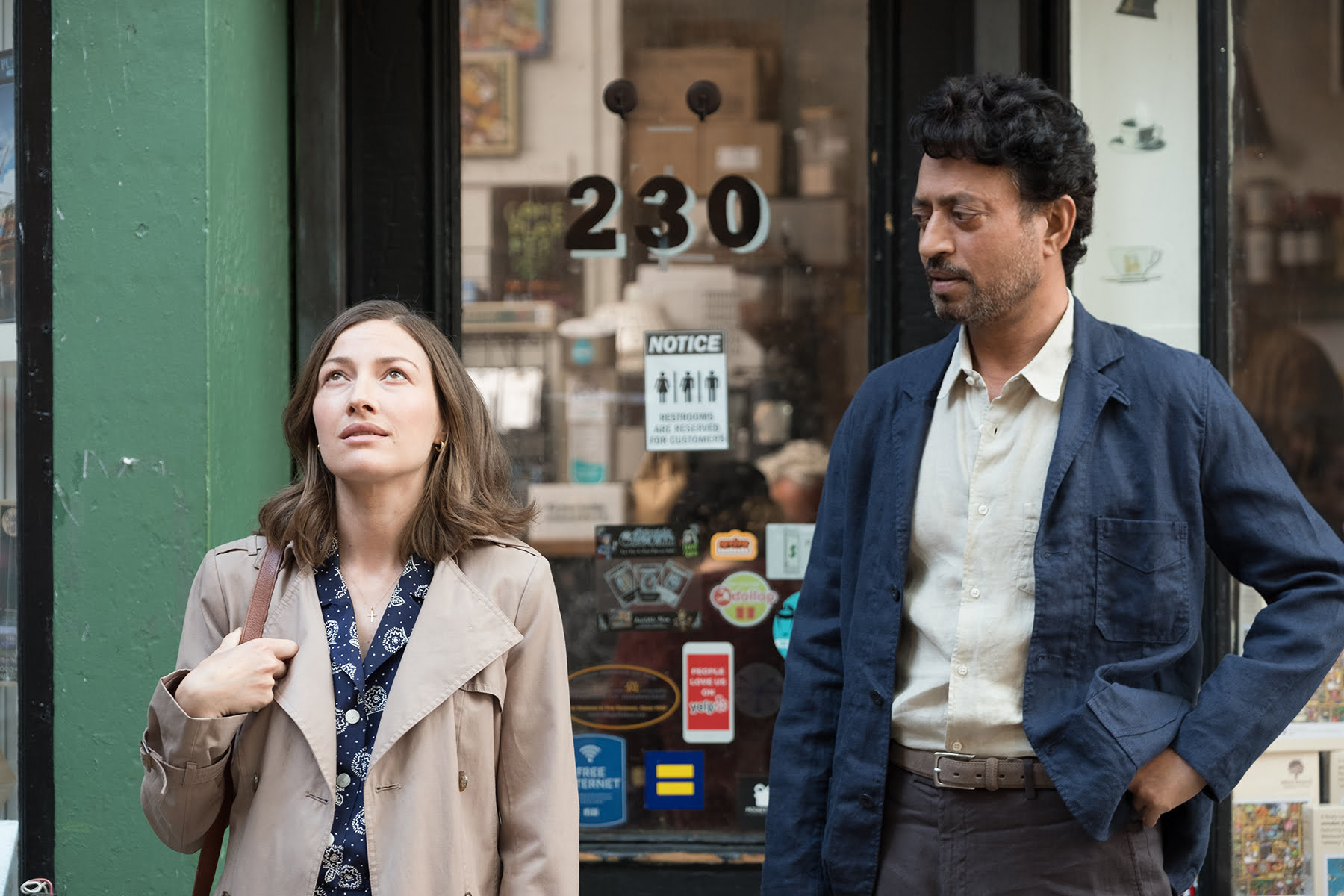Spoiler alert
It’s been more than two months since the tragic and untimely demise of Irrfan Khan. While exploring his filmography, I came across Puzzle (2018), his last film in English language which is based on an Argentinian movie ‘Rompecabezas‘ (puzzle). I only got to watch the English version, and I must say, the woman’s gaze it’s been narrated with (by Polly Mann and Oren Moverman) is overwhelming.
The story revolves around Agnes (Kelly Macdonald), a middle-class suburban homemaker living with her husband Louie (David Denman) and two grown up sons in a monotonous routine. She is religious, devotedly serves the Church and her family without any complains. In the very first few scenes, we see her baking the cake and decorating her house on her own for her own birthday party!

The transformation of her life starts when she gets a 1000-piece Jigsaw puzzle as a birthday gift from her aunt. She solves it quickly and decides to explore her intellectual capacity to solve puzzles. While buying more puzzles from a specialised store in New York, she sees an advertisement saying they need a puzzle partner for a championship tournament. Noticing the contrast between her monotonous life and the sudden excitement the puzzle brought in, she decides to go for it and meets Robert (Irrfan Khan), the person whose advert it was.
Robert is a wealthy and reclusive inventor who loves to solve puzzles and is quite serious about them (as far as participating and winning tournaments are concerned). Agnes finds him weird and very different from herself; yet she decides to participate, because this was the first time she had thought of doing something she liked. Considering her family’s conservative nature and her own fear of getting ridiculed for her ‘childish’ hobby, she lies to her family that she’d have to visit her injured aunt twice a week to take care of her.
The story revolves around Agnes (Kelly Macdonald), a middle-class suburban homemaker living with her husband Louie (David Denman) and two grown up sons in a monotonous routine. She is religious, devotedly serves the Church and her family without any complains. In the very first few scenes, we see her baking the cake and decorating her house on her own for her own birthday party!
Even for a genuine reason of ‘taking care of an injured relative’, her husband does not approve and tries to convince her that she couldn’t do it because she had her own family to take care of; a family that has grown up adults (!) who can actually take care of themselves once in a while (very typical of the ‘man of the house’). Agnes slowly gets frustrated with her life as an unacknowledged constant caregiver and becomes more certain of participating in the tournament. Puzzle portrays what happens when a woman decides to snap out of years of social conditioning of ‘living for others’ and starts defying even the tiniest of the rules enforced on her.

Her friendship with Robert grows gradually and she starts falling in love with him. But the point of the movie is not about romance, it’s about freedom. He is probably the first person that took her seriously, while her family mocked her interest in puzzles. With him she can be herself with no restrictions. He also calls her by her maiden name and tells her that’s who she was. Without expecting much in return, Robert helps her take her own space and time to explore herself by giving her his perception of her. So she starts believing in the possibility of a different ‘Agnes’, which would be complete once she joins all the pieces of her inner self – metaphor of a Jigsaw Puzzle. The movie’s dialogues beautifully express the characters’ ups and downs during the whole journey. You can read some of them compiled here.
Also read: Raw And Relatable: 5 Female Characters Who Transformed Cinema
With her new understanding of herself, she tries to assert her role as a valid and significant individual in the family. She makes major decisions about her sons’ lives and convinces her husband to let their elder son enroll in a cooking academy like he wanted rather than making him do the ‘man’ly work. Gradually, She realises that she needs to have a life of her own, and after finishing all the targets—winning the tournament, ensuring that her sons’ future prospects are in place and giving a closure to her husband about their relationship—she takes a leave from her current life (family as well as Robert) and goes to Montreal alone, probably for a fresh start.
One cannot stop but notice the similarities (apart from Irrfan Khan) between ‘The Lunchbox’ and ‘Puzzle’. Both Ila and Agnes are homemakers stuck in monotonous lives, both have aunties who bring up a major trigger point which changes the course of their lives entirely (Deshpande aunty suggests Ila to write the letter and Agnes’s aunt sends her the puzzle box). In their journey they both interact with a person—completely out of their limited circles (Mr. Fernandez and Robert)—who understands them from a different perspective and gives them new insights into their lives.
One cannot stop but notice the similarities (apart from Irrfan Khan) between ‘The Lunchbox’ and ‘Puzzle’. Both Ila and Agnes are homemakers stuck in monotonous lives, both have aunties who bring up a major trigger point which changes the course of their lives entirely (Deshpande aunty suggests Ila to write the letter and Agnes’s aunt sends her the puzzle box). In their journey they both interact with a person—completely out of their limited circles (Mr. Fernandez and Robert)—who understands them from a different perspective and gives them new insights into their lives. Both of them get triggered by taking a peek into their possible futures if they continue living the same way (suffering of Ila’s mother and Deshpande aunty because of living for others, Agnes’s aunt tells her about the ill-effects of monotony in a marriage). In the end, both Ila and Agnes make up their minds to leave for a journey to explore their lives and start anew, without waiting for a companionship.

Though one of the major differences between the two is that the central point of The Lunchbox is the (non-visual) interaction between Ila and Mr. Fernandez wherein Puzzle, it is Agnes’s own growth as an individual. Also, while in The Lunchbox, Ila’s husband doesn’t have much time for the family and their relationship is numb—he even cheats on her; Puzzle does show Louie and their family time together, he loves her but doesn’t understand Agnes’s suffocation because of his conventional patriarchal upbringing. So while Ila’s husband (deservingly) doesn’t get a say in her decision to leave, Agnes level-headedly communicates her struggle and relationship with Robert to Louie and he tries his best to understand.
Also read: Film Review: ‘The Tale’ Narrates A Powerful Story On Child Sexual…
Like The Lunchbox, Puzzle too, is a very very unusual and improbable story. And yet, we enjoy and fall in love with it, because such stories make us imagine different possibilities, fill us with inspiration and the hope for a similarly beautiful experience!
Featured Image Source: Real Change News
About the author(s)
Mudita Sonawane studies Physics, Hindustani classical music and government policies. She has represented University of Mumbai in the 9th South Asian Universities Festival. She is an avid observer of politics and takes an interest in Photography and painting as well.





Thank you for introducing me to this move :3. But, it would be nice if future movie reviews have a ‘spolier alert’.